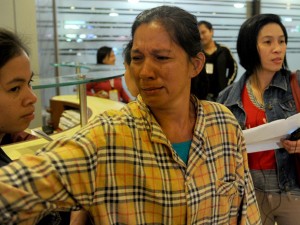Keep calm, OFWs awaiting exit from Saudi Arabia told

Filipina domestic helper Amor Roxas (C), 46, weeps upon arriving at the Philippines’ main international airport on Nov 4, 2013 as she recounts her ordeal after being expelled from Saudi Arabia, where an amnesty for illegal workers expired at the weekend. She is among 30 Filipinos who were deported from Riyadh a day after the amnesty ended, while thousands more without proper working permits remained trapped there, officials say. AFP FILE PHOTO
MANILA, Philippines—The Philippine Embassy in Riyadh has called on overseas Filipino workers (OFWs) there to remain calm while awaiting repatriation, even as Saudi Arabian authorities continued their crackdown on undocumented foreign workers under the Saudization program.
In a statement, the embassy urged Filipino nationals “to familiarize themselves” with the newly released guidelines of the Saudi government, which lay down penalties for overstaying contract workers and their employers.
“[T]he embassy and the Philippine consulate general in Jeddah advise all those who have taken steps to process their final exit and repatriation to remain calm and not panic. The embassy and the consulate continue to coordinate with the authorities concerned for the processing of the final exit visas of those waiting to be repatriated,” said the mission in a statement.
The Saudi government resumed the implementation of its immigration and labor laws this week after extending two grace periods for undocumented foreign workers totaling seven months. The lapse of the second deadline on Nov. 3 signaled the full enforcement of the Saudization program, which gives priority in hiring to Saudi nationals.
The guidelines the Saudi government released this week reinstated regularization and exit requirements suspended during the four-month grace period the kingdom had granted to foreign workers illegally staying there.
Article continues after this advertisementThese include the settlement of fines for expired residency permits and securing a no-objection certificate—a clearance issued by an employer upon termination of a work contract, which is required for those leaving Saudi Arabia or changing jobs.
Article continues after this advertisementThe guidelines also retained the old rule that foreigners kicked out of the country due to violations of its immigration and labor laws would be barred from ever returning to the kingdom.
The rules also raised the stake on employers, saying that those who “employ illegal or absconded workers, provide cover, harbor or transport them or aid them by any means will also be pursued.” Employers of arrested undocumented workers must also shoulder their deportation.
Illegally staying foreign workers who do not have permanent employers must pay for their own deportation.
The Saudi government said offending foreigners “will be accommodated” at its centers pending deportation and would shoulder deportation costs for violators who could not afford their flight home.
The embassy also reported that more than 157,000 Filipinos had corrected their labor status in the last seven months, which includes those who transferred to new employers or corrected their employment data.
The figure does not include overstaying Filipino workers who corrected their immigration status.
Citing information from the Saudi Ministry of Labor, the embassy said 53,330 Filipinos “transferred employment to a new employer” while 104,364 “changed or corrected their professions in the work permit and residence card or iqama.”